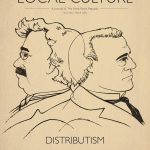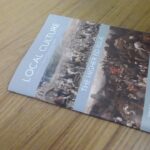“Book Review: Dignity by Chris Arnade.” Jake Meador uses Patrick Deneen’s recent work to frame a reading of Arnade’s photographs and stories. In a book that does not shy away from pain and darkness, Jake finds glimpses of the heavenly city for which we long.
“Oh, the Places We’ll Stay.” Ashley Hales writes for Christianity Today about the allure of space and the redemptive limits of place.
“What Nation isn’t Obsessed with Ensuring Economic Growth? New Zealand, Apparently.” Christine Emba points to New Zealand as an example of a country seeking to base its budget on more wholistic measures than GDP.
“Climate Change Is the Symptom. Consumer Culture Is the Disease.” In The New Republic, Emily Atkin continues to remind readers that Americans need to make personal sacrifices and consume less; it’s insufficient to expect that governments and corporations can “fix” the systemic problems causing climage change. (Recommended by John de Graaf.)
“Where Does Your Plastic Go? Global Investigation Reveals America’s Dirty Secret.” A series of investigative reports for The Guardian finds US plastic causes problems around the world.
“California’s Progressive Betrayal.” Joel Kotkin argues that progressive elites are making California unaffordable for its working-class residents.
“Feasting Even During Ordinary Time.” Gracy Olmstead commends the delights—and inherent limits—of feasting on local, seasonal produce.
“Where Have All the Young Farmers Gone?.” Patrick Bultema calls for a more flexible food system. Currently, because of “the virtually impossible capital requirements necessary to enter the farming industry nowadays,” American farming has bifurcated between big, industrial operations and “yuppie” farmers.
“America Loves the Idea of Family Farms. That’s Unfortunate.” Sarah Taber reminds us that family farms have always been precarious: ”If we’re serious about building food systems that are sustainable and robust in the long term, we need to learn from how farming’s been done for most of human history: collaboratively.” She points to Hutterite communities as one example of how this collaboration can work.
“Joy Harjo Becomes The First Native American U.S. Poet Laureate.” Lynn Neary and Patrick Jarenwattananon report on the new Poet Laureate. Here’s a taste of Harjo’s work:
And whom do I call my enemy?
An enemy must be worthy of engagement.
I turn in the direction of the sun and keep walking.
It’s the heart that asks the question, not my furious mind.
The heart is the smaller cousin of the sun.
It sees and knows everything.
It hears the gnashing even as it hears the blessing.
The door to the mind should only open from the heart.
An enemy who gets in, risks the danger of becoming a friend.







